Frequently asked questions
FAQ
I’ve found a bird on my lawn. What should I do?
Many birds go through a totally normal (but awkward!) stage when they fledge. They leave the nest before they are able to fly properly and can be found hopping around on the ground. Parent birds will come by with food, but will likely not be around all the time.
If the fledgling appears to be healthy and uninjured, is not in immediate danger, and the parents are still around (you may need to observe the area consistently for up to an hour), please do not take these babies! The best place for them is with their family. Simply leave them where they are or carefully place them in a nearby bush.
If there is no sign of the parents, or if the fledgling appears to be sick or injured, then please take them to your local vet or BirdCare center. Please note that we only able to accept native birds, non-native birds should be taken to the vet. To transport a bird, place a towel in a box make some air holes for ventilation, and place the bird inside.
You can also help fledglings by keeping cats at home or under supervision. This is a vulnerable time for birds as they are taking their first steps into the big wide world and can be oblivious to danger. If any cat interaction occurs, the bird needs to be taken to a vet or rehabilitator as soon as possible to start antibiotic treatment. Please tell us if the bird you are bringing in has experienced cat interaction – we need to know, so that we can provide the correct treatment. Please check out the images below for more information.
For further information about fledglings, including how to recognise them and how to check for parents, please take a look at our Facebook post or the images below.
As always, if you wish to discuss any fledgling situations, you are welcome to give us a call or text on 027 816 9219. Our phone is answered between the hours of 10am-2pm daily and we are always happy to provide advice.
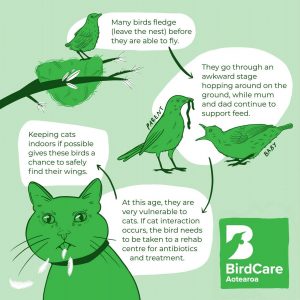
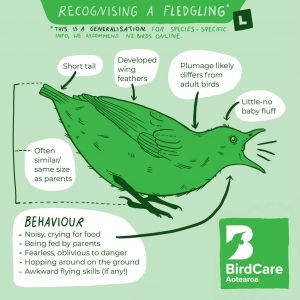
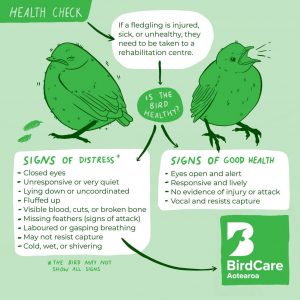
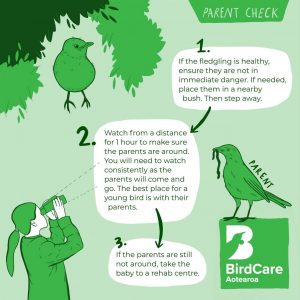
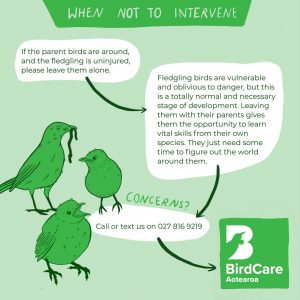
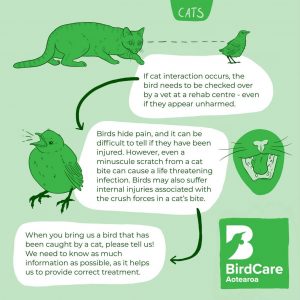
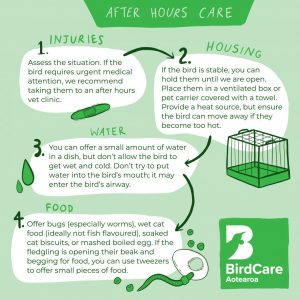
What are your opening hours?
Click here for opening hours: birdcareaotearoa.org.nz/contact/
If a bird requires urgent treatment outside our opening hours, please contact a vet clinic.
Please bring sick or injured native birds straight to our centre during opening hours. You don't need to call us first.
If you need advice, you can phone us during our opening hours 027 816 9219 - we may not always be able to answer the phone during busy periods.
What is your address?
74 Avonleigh Road, Green Bay, Auckland 0604. You can find us on Google Maps.
Do I need an appointment to bring a bird to your centre?
You do not need to make an appointment. If the native bird is sick, injured or orphaned, please bring them straight to our centre during our opening hours. Non native birds must go to your local vet for treatment. There will be no charge for this.
As of Feb 2025, we are open between 10am and 2pm daily, except the following days when we are closed:
- Christmas Day (25 December)
- Boxing Day (26 December)
- New Year's Day (1 January)
- Day after New Year's Day (2 January)
If you wish to speak with us first or need advice, please phone us between 10am and 2pm.
Do I need to pay a fee when I bring a bird to your centre?
We provide a free service to the public. However, as we do not receive government support and rely entirely on donations, we kindly request a voluntary donation towards the care of the bird.
Your donation is very much appreciated and will enable us to provide veterinary care and support for all birds brought to our hospital.
You can donate in person when you drop off the bird or online.
I’ve put an injured bird into a box. What can I feed them?
Please do not feed the bird anything. Do not place water in the box as it may tip over, wetting the bird and putting it at risk of hypothermia.
Injured native birds can be brought straight to BirdCare center, and injured non-natives to your local vet
If the bird requires urgent medical attention and we are closed, we recommend taking the bird to an after-hours veterinary clinic.
My cat caught a bird. The bird is still alive but doesn’t seem hurt or injured. What should I do?
All birds caught by cats need to be checked over by a veterinarian and will need antibiotics - even if there is no obvious sign of injury. The bird may have internal injuries and even a tiny scratch from a cat can cause a life-threatening infection.
Place the bird in a ventilated box with a soft towel and bring them to our centre as soon as possible. Please tell us that the bird was caught by a cat. This information is important as it helps us to provide the correct treatment.
For more information, take a look at our Facebook post about cat interactions with birds.
There is an injured bird in the park. Can you come and get them?
Unfortunately not - we are a small team and we do not have the resources to provide a collection service.
If possible, please ask your family, friends, or passersby for help with rescuing the bird and transporting it to us. Alternatively, you can send the bird to us during our opening hours in a taxi or Uber, or take the bird to your nearest veterinary clinic, or contact your nearest SPCA centre.
I have an injured bird in a box. Your centre is closed. What can I do?
If the bird requires urgent veterinary attention, we recommend taking them to an after-hours veterinary clinic, such as:
- North Shore Veterinary Emergency & Critical Care – 96B Ellice Road, Glenfield – Phone 09 443 5640
- VSA - Sylvia Park and Henderson – Phone 09 849 2121
- Auckland Emergency Vet – 2/348 Rosebank Road, Avondale – Phone 09 820 7273
- Manukau After Hours Veterinary Clinic – 15 Jack Conway Avenue, Manukau – Phone 09 277 8383
- ARC - Albany and Freemans Bay - Phone 09 281 5815
If the bird stable, you can keep them overnight until you can bring them to the vet or BirdCare center. BirdCare can only accept native birds. All non-native birds must go to your local vet for treatment. There will be no charge for this.
Place a towel in a box and make some air holes so that there is sufficient ventilation. Leave the box in a quiet, dark, and warm place overnight.
Do not feed the bird (unless it is a baby and begs for food - see our Facebook post about after-hours care).
You can offer a small amount of water in a dish, but don't leave water in the box as it may tip over, wetting the bird and putting it at risk of hypothermia.
Keep voices low and ensure you keep any pets away from the bird.
For more information, take a look at our Facebook post about after-hours care.
What should I do if I need to keep the bird overnight?
Place a towel in a box and make some air holes so that there is sufficient ventilation. Place the bird in the box and leave it in a quiet, dark, and warm place overnight.
Do not feed the bird (unless it is a baby and begs for food - see our Facebook post about after-hours care).
You can offer a small amount of water in a dish, but don't leave water in the box as it may tip over, wetting the bird and putting it at risk of hypothermia.
Keep voices low and ensure you keep any pets away from the bird.
For more information take a look at our Facebook post about after-hours care.
Can I come and collect the bird I rescued so that I can release them?
If you wish to release the bird, we can make a note on your file. However, we cannot guarantee that you will be able to release the bird yourself - this will depend on the species of the bird and other considerations.
Some territorial birds such as juvenile tūī cannot be released where they were found as they will be attacked by other tūī already residing in that area. Other birds, such as tītī (Cook’s petrel), require specialised habitats or conditions.
If the bird I rescued is not releasable can I keep them as a pet?
No, you cannot keep a wild bird as a pet. This would not be in the best interests of the bird and, depending on the species, may constitute an offence under the Wildlife Act 1953.
Do you release birds to a carer if they can’t be released into the wild?
In general, we will only release birds to a carer when the bird is a domesticated species, e.g. a chicken, goose or Muscovy duck. If a situation arises where a native bird is unable to be released, we will work with the Department of Conservation and other organisations to ensure the best outcome for the bird.
Can you return the bird to me once you’ve treated them?
Unfortunately, no. All birds brought to the centre are surrendered into our care.
Will the bird I rescued be euthanised?
Euthanasia offers a gentle ending to life where there are few options. That may be because the injuries sustained will preclude release, or that captive management would be a poor option, or the chance of survival is low.
Euthanasia is never our first option. During the initial examination, the veterinarian will determine whether the bird is suffering. If the root cause of the bird's pain is untreatable, or if the bird has a serious injury that would compromise their survival in the wild, then the most humane decision may be to euthanise the bird. This decision is never taken lightly as we want to give all wild birds a second chance at life.
As professional wildlife rehabilitators, we follow the Code of Professional Ethics, set in place by the International Wildlife Rehabilitation Council (IWRC) and the National Wildlife Rehabilitation Association (NWRA) and practiced by all Certified Wildlife Rehabilitators (CWR) as a condition of their unique qualification. This Code states that: Non-releasable animals, which are inappropriate for education, foster-parenting, or captive breeding have a right to euthanasia.
If the bird I rescued dies at the rehabilitation centre, can I take them home and bury them?
Unfortunately, no - all birds brought into our rehabilitation centre are surrendered into our care. We will ensure that the bird's remains are handled appropriately.
My neighbours are feeding bread to ducks. How can I stop the ducks coming onto my property and soiling my garden?
Encourage your neighbours not to feed the ducks if you can, and the ducks will likely migrate elsewhere.
Alternatively, you might wish to consider installing sensor sprinklers on your property or gently using a water hose to deter them.
I feed the birds but I want them to go away because they are leaving a mess on my roof and property. How do I make them leave?
Feeding wild birds will encourage them to stay on your property and, in many cases, can create a risk of disease transmission. If you want these birds to leave your property, you will need to stop feeding them.
Please remember that wild birds are an important part of the ecosystem, many play an important role as plant pollinators or seed dispersers, as well as important cultural and social roles.
I have birds outside my house making a noise. Can you come and pick them up and put them somewhere else?
No, we are a wildlife rehabilitation centre and do not offer this service.
Wild birds are an important part of the ecosystem. They help maintain sustainable population levels of their prey and predator species and, after death, provide food for scavengers and decomposers.
Many birds play an important role as plant pollinators or seed dispersers. For example, kererū are essential for the survival of forest ecosystems – they are the only birds in Aotearoa who can disperse the seeds of large-fruited native trees such as karaka.
Birds also play important cultural and social roles, are taonga for Māori and others, and bring joy to many people’s lives. They appear in literature, art, and mythology worldwide. Birdsong enriches the outdoors and bird-watching is one of the fastest-growing recreational activities.
Depending on the situation and species of bird, it may be appropriate to contact your local Council office for advice.
I don’t want my pet bird anymore. Can you take them?
No, we are a wildlife rehabilitation centre and are unable to accept pet birds due to risk of disease transmission to wild birds.
If you find a lost or abandoned pet bird, please contact your nearest SPCA centre.
Do you accept roosters?
No, we are not permitted to accept roosters due to Council regulations.
Please contact The Animal Sanctuary for advice.
I would like to come and have a look around. Can I come in now?
No, we are not open to the public. Our hospital and rehabilitation centre houses sick and injured birds who need a quiet and low-stress environment to support their recovery and give them the best chance of release into the wild.
What items are you needing for donation? Where do I buy them?
Our wish list can be found here. Most of these items can be found at your local supermarket.
If you wish to donate something specific, please call us for supplier details.
How old do I have to be to volunteer?
To volunteer in BirdCare Aotearoa's main hospital, you must be 18 years of age or older. There are limited volunteer opportunities available for under-18s accompanied by a parent or guardian, including cleaning, gardening, and insect rearing.
If you are under 18, there are many ways you can support our work, and help protect wild birds and their habitats. For example, depending on your age, you could:
- plant an edible native – harakeke/flax, kawakawa, karamu/coprosma, and pōhutukawa are all enjoyed by our native birds!
- organise or participate in a beach or river clean-up – misplaced rubbish causes harm to wildlife
- ‘adopt’ a section of bush to care for – remove invasive weeds and rubbish to allow the trees to grow. Or choose a section of bare land and help to regenerate the bush. This helps to create safe habitats for wildlife.
- participate in weed removal, trapping, and ecosystem restoration activities
- learn about the cultural significance of native bird species for Māori
- create an enclosed outdoor space for your pet – this will keep your pet safe and prevent unintentional harm to wild birds
- fundraise for BirdCare Aotearoa
- organise a bird-themed event at your school
- start an environmental protection group at your school
- get creative – create a bird-inspired story, poem, dance, or artwork
- explore and connect with nature – go bird-watching at the beach, in the bush, or in your own backyard
- keep a nature journal with observations, photographs or sketches of birds
- learn about your favourite wild birds on https://nzbirdsonline.org.nz/
- share your knowledge about birds with your whānau and friends – and inspire them to learn about, connect with, and take action to protect birds
Do you take hedgehogs and other non-avian species?
No, we are a bird rehabilitation centre and only accept wild birds.
Please contact your nearest SPCA centre or veterinary clinic for advice.
I’ve found a bird caught in a parapara tree. What should I do?
Any bird caught in parapara needs immediate attention, especially fantails or grey warblers as they can't go long periods without food.
Do not cut the bird's feathers. Cut off the branch/twig and bring the bird into us (no need to phone first), to your nearest bird rescue centre or, if outside our opening hours, to your nearest after-hours veterinary clinic.
The tree does not need to be cut down or destroyed. Cut the sticky pods off the tree, collect them off the ground, and place them in a bag. Alternatively, remove the pods from the tree after flowering, or cover the whole tree in bird netting during flowering.
Garden centres sell these trees as ornamental garden/house plants, but they generally don't display warnings about the possible dangers to wildlife. Please share your knowledge about the impact of these trees on wild birds. Raising awareness may help others make an informed decision as to an appropriate place to plant these trees.
Where are the after-hours veterinary clinics in Auckland?
If a bird requires urgent veterinary attention outside of our opening hours, we recommend taking them to your nearest emergency veterinary clinic, such as:- North Shore Veterinary Emergency & Critical Care – 96B Ellice Road, Glenfield – Phone 09 443 5640
- VSA - Sylvia Park and Henderson – Phone 09 849 2121
- Auckland Emergency Vet – 2/348 Rosebank Road, Avondale – Phone 09 820 7273
- Manukau After Hours Veterinary Clinic – 15 Jack Conway Avenue, Manukau – Phone 09 277 8383
- ARC - Albany and Freemans Bay - Phone 09 281 5815